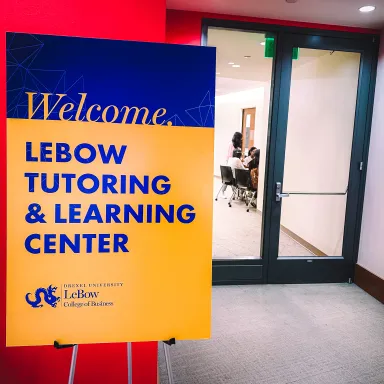
New Center Meets a Growing Need for Academic Support
The current generation of incoming college students has faced challenges unlike any other. Major upheaval during their formative high school years has spanned from having to re-learn how to learn due to a global pandemic forcing the shutdown of in-person classes, to experiencing larger class sizes resulting from cross-country teacher shortages.
While LeBow’s students have already overcome these hurdles to earn a competitive spot, there is an increased demand for tutoring centered on our College’s quantitative courses taken early on in a business student’s plan of study, particularly in accounting, business analytics, economics, finance and statistics. The establishment of the LeBow Tutoring and Learning Center is the first step in building a more robust infrastructure to serve this growing need.
The Center, established through LeBow’s Center for Innovation in Teaching and Learning, has been hiring student workers over the past several weeks and student appointments are available as of week two of the spring term.

Where tutoring was previously done informally through individual departments or through LeBow’s Dean’s Student Advisory Board, the Tutoring and Learning Center, through the generosity of the Dean’s Advisory Board and other donors, will have both a dedicated space, in Gerri C. LeBow Hall Room 305, Gerri C. LeBow Hall’s third floor, and a lineup of paid student tutors providing services.
Stacy Kline, assistant dean of teaching and learning and clinical professor of accounting, notes that tutors receive instruction in practicing leadership skills through Drexel’s Academic Resource Center.
“We want to build a new structure and create a community of learning,” she says.
The Center is open to graduate students as well, and Kline notes that quant-heavy courses in economics and statistics have emerged as areas of need for tutoring among LeBow’s graduate student body.
Emma Glackin, undergraduate academic advisor, has worked to coordinate the launch of the Center and anticipates that having a physical space for tutoring will have positive spillover effects on student engagement and interaction.
“A lot of students just come to GHall for class and then meet with their advisors on Zoom, so they aren’t taking advantage of office hours,” she says. “I want them to feel more comfortable coming to their advisors with questions, spending time in the third-floor offices and just popping in to chat.”
After a “soft launch” at the start of spring term, the Center will increase staffing and availability throughout the term leading up to midterm examinations.
With the rollout of revisions to LeBow’s undergraduate curriculum this fall, new areas of need may arise, and Kline says everyone involved with the Center will adapt.
“I want to see students getting the support they need, feeling confident in the courses they’re taking and feeling solid in their majors,” she says.



